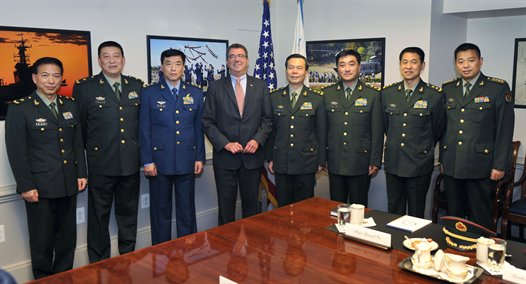Application of US-Japan treaty to Diaoyu Islands opposed
 0 Comment(s)
0 Comment(s) Print
Print E-mail Xinhua, August 25, 2012
E-mail Xinhua, August 25, 2012
China strongly opposes any application of the U.S.-Japan security treaty to China's Diaoyu Islands, a visiting senior Chinese military official told his U.S. colleagues here on Friday.
|
|
|
U.S. Deputy Defense Secretary Ashton B. Carter poses with Cai Yingting, Chinese deputy chief of the General Staff of the People's Liberation Army, and his delegation stand for a photograph before a meeting at the Pentagon, Aug. 23, 2012. DOD photo By Glenn Fawcett |
During meetings with senior U.S. military and government officials, Cai Yingting, deputy chief of the General Staff of the Chinese People's Liberation Army, expressed China's strong concerns over issues related to China's vital and core interests, including the U.S. arms sales to Taiwan, the territorial disputes over South China Sea and the Diaoyu Islands, and U.S. close-range military reconnaissance activities directed at China.
In an interview with the Chinese media based in Washington, Cai said he told his U.S. hosts that the Diaoyu Islands and their affiliated islands have been part of China's inherent territory, and all the recent illegal activities by the Japanese, including the bid to "purchase" and the right-wing activists' landing on the islands, are completely invalid.
China is firmly opposed to the U.S. stance that the Diaoyu Islands fall within the scope of the 1960 U.S.-Japan Treaty of Mutual Cooperation and Security, under which Washington will provide assistance to Tokyo when the territories under Japan's administration come under armed attack, he said.
The delegation also urged the U.S. side to make more efforts to ease the tensions so as to safeguard peace in the Asia-Pacific and maintaining the good impetus in the development of the overall China-U.S. relations.
Cai said China hopes the two countries will strive to implement the important consensus reached by Chinese President Hu Jintao and his U.S. counterpart Barack Obama on building a new type of relationship between big powers, on the basis of mutual respect, equality, and inclusiveness.
The Chinese general added that the two sides should take concrete steps to deepen the China-U.S. military ties, which have been repeatedly interrupted by the U.S. arms sales to Taiwan, including promoting exchange of high-level visits, as well as increasing cooperation in conducting naval escort missions in the Gulf of Aden.
Cai said he also proposed to the U.S. side to hold exchange of views on war theories and studies, and combat strategies and tactics, which he believes will be conducive to the healthy and stable development of the military-to-military relations.
He disclosed that U.S. Defense Secretary Leon Panetta is going to visit China in September, and the Chinese side is making serious preparations for Panetta's trip in order to make it fruitful.
The Chinese delegation, which arrived in the United States on August 20th for a week-long official visit, has already held separate talks with senior U.S. military and government officials, including Deputy Defense Secretary Ashton Carter, Deputy Chairman of Joint Chiefs of Staff James Winnefeld, U.S. Army's Vice Chief of Staff Lloyd Austin, and Under Secretary of State for Political Affairs Wendy Sherman.
The delegation has also visited the U.S. military bases of Fort Hood in Texas and Leonard Wood in Missouri, and held discussions with U.S. experts at the Washington-based think tank Center for Strategic and International Studies.







Go to Forum >>0 Comment(s)